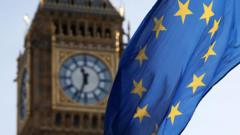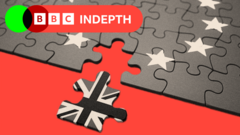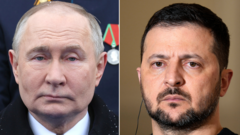The long-anticipated EU-UK summit signifies a pivotal moment for bilateral relations, driven by external threats and a desire for partnership in challenging times.
UK and EU Summit: Navigating New Alliances Post-Brexit

UK and EU Summit: Navigating New Alliances Post-Brexit
As the UK and EU hold their first summit post-Brexit, officials focus on cooperation amidst geopolitical tensions.
In London, the UK and EU will convene for their first summit since Brexit, a meeting underscoring the urgency for collaboration amid rising global uncertainties. Despite historical grievances following Brexit, the current geopolitical climate—marked by the war in Ukraine, tensions in Europe with Russia, and a reevaluation of defense strategies following the Trump administration—has prompted both sides to explore closer ties.
The summit's agenda reflects a shared recognition of these pressing international issues, including a joint declaration reaffirming commitments to support Ukraine and curb Russian aggression. Additionally, a newly proposed security and defense pact seeks to enhance cooperative efforts, reinforcing the notion that collaboration is essential in an increasingly unpredictable world.
However, as discussions unfold, key hurdles still remain. Negotiations have reportedly been complicated by France’s insistence on preserving its fishing rights in UK waters—an area of contention that threatens to stall potential agreements. Moreover, the UK’s attempts to regain economic footing post-Brexit have created a complex landscape. Prime Minister Keir Starmer's administration is navigating calls for reduced trade barriers with the EU while facing pressure from domestic Eurosceptics.
A key aspect of the negotiations includes a plant and animal health agreement to facilitate smoother trade, particularly concerning Northern Ireland, but adherence to EU regulatory standards poses challenges for ardent Brexit supporters in the UK. Furthermore, discussions around "mobility" initiatives represent another significant theme; they hint at potential pathways for recognizing UK professional qualifications in the EU and easing travel restrictions for young professionals.
Amidst debates over economic cooperation and security contracts, the summit illustrates the delicate balance both sides aim to strike. The UK's defense industry is looking to gain access to EU markets, which has been met with resistance from member states hoping to prioritize domestic firms in upcoming arms contracts.
Despite these tensions, the summit represents a turning point where both parties express an eagerness to foster mutual interests, recognizing that the uncertain global landscape necessitates solidarity. As the summit progresses, the world will watch to see if this dialogue can translate into tangible agreements or if the historical divisions will once again overshadow prospects for collaboration.
The summit's agenda reflects a shared recognition of these pressing international issues, including a joint declaration reaffirming commitments to support Ukraine and curb Russian aggression. Additionally, a newly proposed security and defense pact seeks to enhance cooperative efforts, reinforcing the notion that collaboration is essential in an increasingly unpredictable world.
However, as discussions unfold, key hurdles still remain. Negotiations have reportedly been complicated by France’s insistence on preserving its fishing rights in UK waters—an area of contention that threatens to stall potential agreements. Moreover, the UK’s attempts to regain economic footing post-Brexit have created a complex landscape. Prime Minister Keir Starmer's administration is navigating calls for reduced trade barriers with the EU while facing pressure from domestic Eurosceptics.
A key aspect of the negotiations includes a plant and animal health agreement to facilitate smoother trade, particularly concerning Northern Ireland, but adherence to EU regulatory standards poses challenges for ardent Brexit supporters in the UK. Furthermore, discussions around "mobility" initiatives represent another significant theme; they hint at potential pathways for recognizing UK professional qualifications in the EU and easing travel restrictions for young professionals.
Amidst debates over economic cooperation and security contracts, the summit illustrates the delicate balance both sides aim to strike. The UK's defense industry is looking to gain access to EU markets, which has been met with resistance from member states hoping to prioritize domestic firms in upcoming arms contracts.
Despite these tensions, the summit represents a turning point where both parties express an eagerness to foster mutual interests, recognizing that the uncertain global landscape necessitates solidarity. As the summit progresses, the world will watch to see if this dialogue can translate into tangible agreements or if the historical divisions will once again overshadow prospects for collaboration.


















